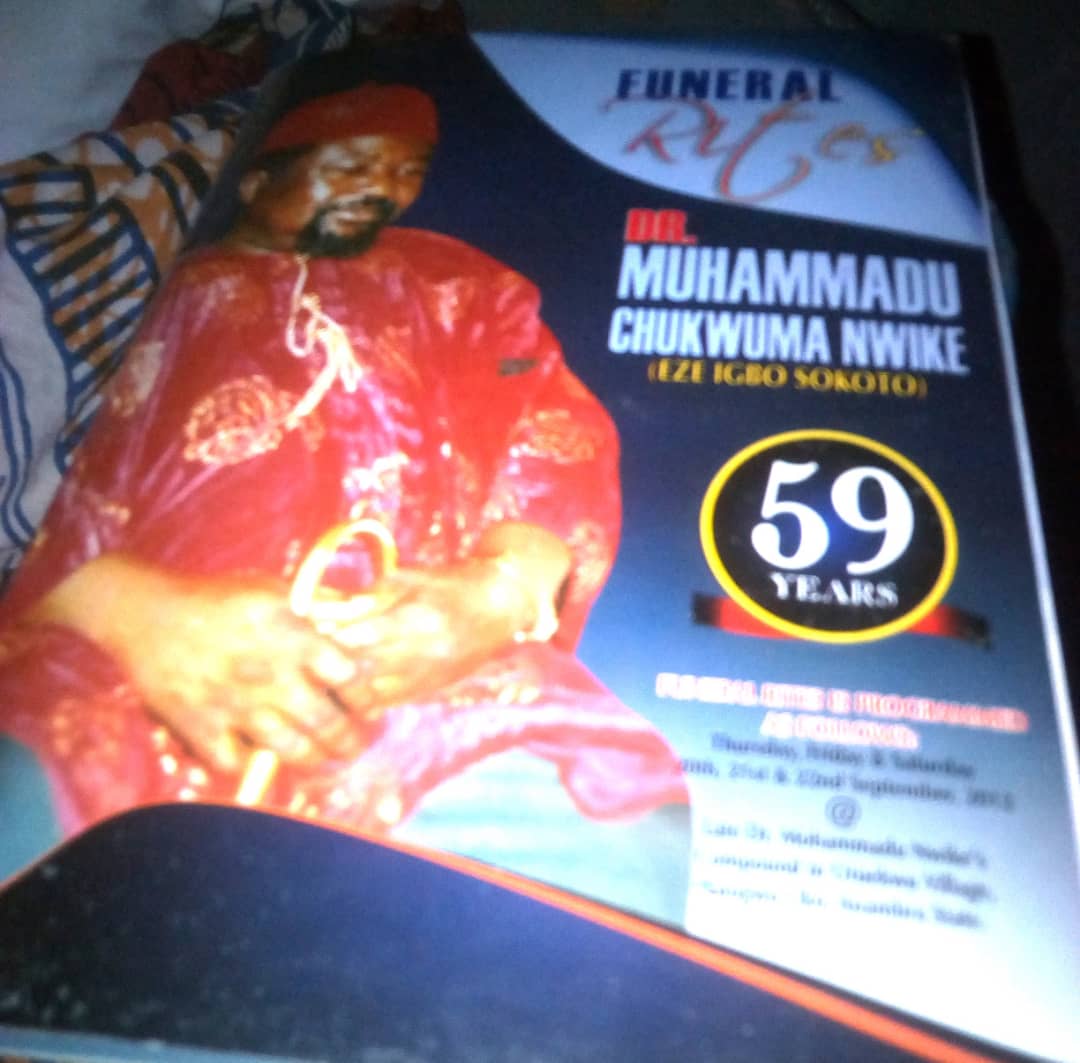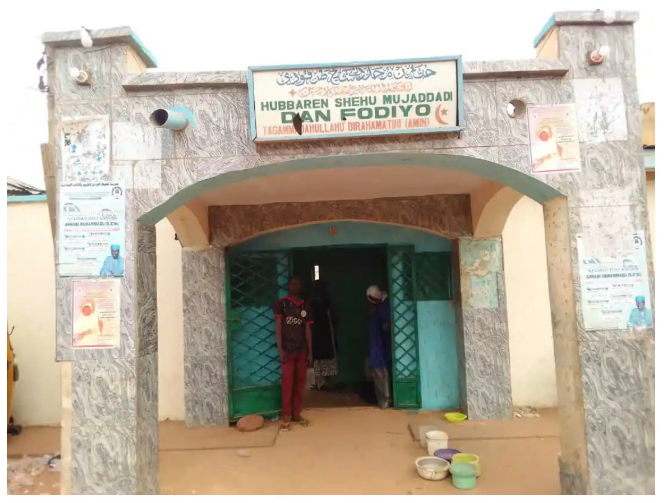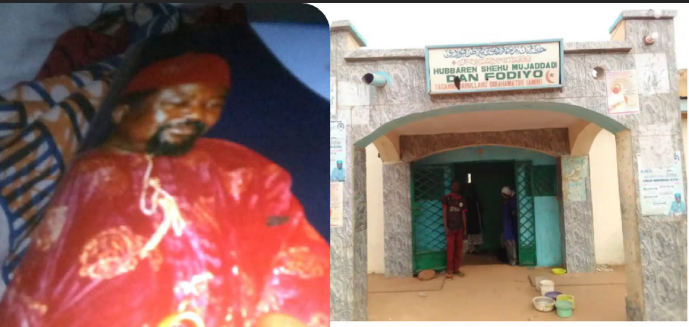Hubbaren Shehu is the mausoleum housing the tomb of the revered Islamic reformer and founder of Sokoto Caliphate, Sheikh Usman bin Fodiyo.
However, the place was later turned to a full-fledged royal cemetery where a good number of the 19 century reformer’s lieutenants were buried.
It is also the burial place for deceased Sultans who were his direct descendants.
21st CENTURY CHRONICLE learnt that so far, eight Sultans have been buried there, the latest being Sultan Ibrahim Dasuki who died six years ago
However, there were other people who were not from the Shehu’s family but who were buried there for a variety of reasons.
They include the late Marafan Sokoto, Umaru Aliyu Shinkafi who was married to the daughter of the late Premier of Northern Nigeria, Ahmadu Bello, Sardaunan Sokoto who was a direct descendant of Danfodiyo, and interestingly, the former Eze-Igbo of Sokoto, Dr. Muhammadu Nweke.
The Igbo man resting besides Sheikh Fodiyo
Dr Nweke was the private physician to the late Sultan Muhammadu Maccido and was said to be the first Igbo man to be made a member of the royal family.

He converted to Islam in 1999 and died on June 17, 2012 at the age of 59.
Nweke, a medical doctor cum hotelier, embraced Islam in 1999 and was said to be the private physician of late Sultan Muhammadu Maccido.
Dr Nweke who was formally known as Martins Chukwuma Nweke was born in 1953 in Gusau, the capital of Zamfara state.
In 1998, he contested and got elected as Eze Igbo of Sokoto. He was also appointed as the Chairman, Police Committee Public Relations (PCPR) in Sokoto Metropolis.
21st CENTURY CHRONICLE learnt that Dr. Nweke was married to three wives but only one remained with him at the time of his death. She was a Fulani woman from Wurno local government area called Nana Asma’u.
His first wife was Jacqlyn Nkech Nweke who is currently living in London with their five children, while the second one was Binta who has three children with him before their divorce.
Chief Anene Aike, a Public Relation Officer of the Igbo Progressive Union in Sokoto state, described the late Eze-Igbo as a complete gentleman who led them well.
“He was the only non-indigene to be admitted into the royal family of Sokoto state since the reign of Usman Danfodiyo,” he claimed.
Aike recalled that, his conversion had generated a lot of problems among the Igbo community in the state which led to the creation of a parallel association of Igbo.
“But despite this problem, we still hold him in high esteem. He was a leader per excellence and highly religious,” he said.
A member of the royal family who spoke on condition of anonymity, corroborated Mr Aike, saying Dr Nwike was very close to the royal family being a private physician to the sitting Sultan.
He said he was the only Igbo man to be buried among the Sultans in Hubbare.
Hubbare: Suktans resting place
Hubbare was formerly the private residence of the late Islamic Reformer and after his death on April 20, 1817, he was buried in one of his wives’ rooms, Hauwa’u, the mother of the first Sultan of Sokoto, Muhammadu Bello.

Beside the Shehu’s tomb were the graves of two of his sons who died shortly after him, Sambo and Hassan. The house still maintains its ancient architectural designs despite undergoing some renovation.
After entering the house, the first thing you encounter is ‘Jangirde’, a classroom where Shehu taught his students. A few steps away from ‘Jangirde’ is the entrance to the late Shehu’s tomb with turbaned men who serve as guards sitting by the door.
There is also the other side of Hubbare which used to be the rooms of wives of the late Shehu and as at the time of our visit, the rooms were still occupied by women whose lineages could not be ascertained by our reporter.
Hundreds of pilgrims visit Hubbare every day from different parts of the country and beyond to pay their respect and pray for the great Islamic Reformer and founder of Sokoto Caliphate.
At the time of the visit, our reporter observed that regular visitors to the site were Fulani who came in large numbers. It was gathered that they usually spend days there especially during the major Islamic festive periods of Eid and Maulud.
Some of the Fulani hold the belief that a visit to the tomb can make up for those who cannot afford to perform Hajj exercise in the Holy Land of Mekkah while others visit the tomb to pray for bumper harvest.
These particular visitors come along with grains which they spread on the graves of the Shehu’s lieutenants but one of the guards at the site who pleaded for anonymity, told our reporter that there are people recruited to guide the pilgrims on the etiquette of visiting the burial site to avoid actions that are contrary to Islamic teaching.
“Some of the pilgrims are ignorant of these etiquettes. They are do things which are contrary to the teachings of the Holy Prophet (SAW).
“Some of them spread grains on graves of prominent lieutenants of Shehu which is very wrong. So our job is to educate them. Teach them what to do and say while visiting graves,” he said
According to him, some of those who visit the site are those who could not make it to the Holy Land to visit the tomb of the Holy Prophet (SAW).
“They therefore come to Sokoto to visit the tomb of Shehu,” he said
Mai Bude Hubbare (the person in charge of opening and taking care of Hubbare), Alhaji Bala Ibrahim, told 21st CENTURY CHRONICLE that they receive more visitors during the eid-el-Kabir, Maulud, and Shura festivals and the pilgrims cut across sexes and races.
“During these periods we witness unprecedented surge in the number of visitors that we have to allow some into our private houses because the two guest houses we have are usually not adequate to accommodate them,” he said.
On why the Fulani are the most regular visitors to the site, he said it could be because Shehu was from their tribe but added that people from other tribes also visit the site.
Ibrahim explained that they usually take advantage of the visit to preach the gospel of peace and unity among the ‘ummah’.
It was observed that the burial site was unkempt but the Mai Bude Hubbare attributed the poor sanitary condition to the influx of pilgrims.
“But we are doing our best to keep it clean and secured,” he added.
Ibrahim further pointed out that there is always a boom in business activities around Hubbare area because of the visitors.
One of the Pilgrims, Malam Shehu, a nomad from Kayama in Kwara State, could not hold back his joy while speaking to our reporter.
“I feel happy coming here and I pray to come back again and again,” he said.
Shehu who is in his 60s and named after the late reformer, said he was vising the site for the first time as he came to Sokoto only to pick his daughter in-law.
“I feel happy coming to this place. If God permits, I will return here next year,” added.
Shehu requested for a picture of ‘Jangirde’ in order to have something to prove to his kinsmen that he was once a visitor to Hubbare.









